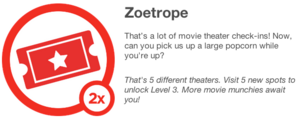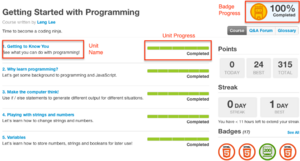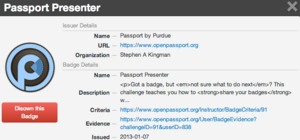Documentation:CTLT Resources/Badge Report

Depending on who you talk to, badges are a visual representation of an achievement (e.g. degrees and diplomas) , proof of proficiency in a particular skill (e.g. Scouts Canada) or a reward/recognition for performing a task (e.g. military badges).
The Mozilla Foundation, creators of Firefox, recognized the range of skills participants demonstrated during their 2010 Mozilla Festival (MozFest) during their "maker sessions". These same skills were not represented or in some cases recognized due to a lack of formal certification from educational institutions. The Open Badge Initiative (OBI) was developed to bridge the gap in the recognition of out of school learning that many people go through on a regular basis.
Many organizations have now experimented or adopted digital badges as a way to certify skills, engage learners and signify achievements. The CTLT Badges Hot Team explored the teaching and learning implications as well as the needed technical infrastructure to implement a badging system within UBC. This report attempts to summarize those findings.
Teaching and Learning
According to Mozilla's specifications, badges have the following metadata attached to them:
- Issuer - who issued the badge
- Issue Date - when the badge was awarded
- Criteria - how the badge was earned
- Hyperlink - links to artifacts, documents, etc as evidence of the work performed
- Authentication - verification back to the issuer
Each of these fields have implications regarding teaching and learning.
Who will issue badges?
There are a number of organizations that are currently issuing badges for their learners. They come from a variety of different fields from government institutions (e.g. NASA), non-profit organizations (e.g. 4-H) and learning ventures (e.g. Khan Academy).
Educational institutions have expressed interest in a badging system but so far, badge issuers have been from after school programs and those that offer extracurricular activities. Purdue University has been the only research-intensive university that has implemented a university-wide badge system called the Purdue Passport. Since their launch last September, they've been encouraging instructors to use the web and iOS app to create badges for their class. [1]
In New South Wales, Australia, an initiative called Pathways for Learning, Anywhere, anytime – a Network for Educators (PLANE) aims to empower the Australia's educators to take advantage of technology and pedagogical best practices in their own teaching context through workshops, resources and community gatherings. They have developed an online system for their resources and professional development with a game layer to engage members in their learnings. More information can be found at http://my.plane.edu.au/. Badges are awarded in PLANE as a people progress through the game as they complete particular tasks or gain certain skills. At the same time, participants are also awarded by badges by their peers depending on their contributions to the community.
Takeaway: Badges can be awarded by a variety of stakeholders across the university of community
Questions for Consideration
- Who will be issuing badges at UBC?
- How can badges be used to support flexible learning?
- Will there be institutional badges awarded by departments or units on campus (e.g. Passport of Participation)?
- Will instructors be the only ones to award badges to students?
- Should peers (i.e. faculty, staff, students) be able to award badges to each other?
- Who will get to decide who is an issuer and who is not?
What are the criteria for awarding badges?

Degrees are awarded to students who have passed the many challenges of university and met certain criteria, qualifying them to graduate. It symbolizes a reasonable approximation of a person's skills and knowledge regarding a field. For degrees to have value, they have to be recognized outside of the university context as well. Assessments need to be recognized as appropriately challenging.
Badges need to have very defined criteria to be able to symbolize value to both the earner as well as to those they show them to. Issuers award different sets of badges for different sets of criteria.
Foursquare awards a set of badges based on the number of times you've checked into a particular type of location (e.g. coffee shops, bakeries). Your badge level increases as you check into more places of the same type. See their description below:
"Expertise badges represent who you are and what you know best. Whether you’re a pizza connoisseur or a sushi fiend, your badge levels reflect how much you’ve explored in the real world."
The value of a particular foursquare badge relies upon the earner's experience in exploring different places. This experiential and for the most part, local knowledge or expertise is what foursquare is trying to emphasize as valuable

For the code-learning service CodeAcademy, badges are awarded based on the number of exercises and which lessons you have completed. You gain skills and a better understanding of coding through short exercises that have clearly defined tasks (e.g. Change text colour through CSS). Exercises are grouped into several units, which in turn are part of larger learning goals. Although you can go in and out of different learning goals, exercises within a unit need to be completed in a specified order if you want to progress and gain a badge.
Takeaway: The value of badge is also reflected on the criteria for receiving one.
Questions for Consideration
- What are the possible criteria for receiving/awarding badges?
- Will there be badge tracks/levels?
- Will badges be counted towards curricular, co-curricular and/or extra-curricular activities?
- How will a badge reflect on UBC's reputation and goals as a top-tier institution?
What's the evidence of achievement?

Since degrees are awarded at the end of a program, it is an aggregate symbol of all the skills and experience a learner has gained. As a result, the specific skills and personal growth learners want to highlight to potential employers are abstracted. Badges are a complement to degrees since they can make a learning path more visible as learners start collecting them. They can be presented in their own personal spaces (e.g. sites, blogs, portfolios).
In addition to challenging criteria, the learner's evidence of their work needs to be attached to the badge in order to make badges more valuable and understandable.
diy.org is an organization that aims to encourage the youth to become "Makers".[2] You can earn badges skills-based badges such as Biologist or Filmaker. Unlike other badge services, diy does not have a set criteria for each badge, just a series of challenges that a learner can take on. Completing a challenge only requires uploading an evidence of your work. A badge is earned when you complete a minimum number of challenges.
The lack of criteria has two interesting consequences. One is that it reduces the perceived value of a badge since anybody can gain it, regardless of the quality of their work. On the other hand, this emphasizes the value of a badge based on the evidence the learner creates. Employers will not necessarily hire somebody based on the degree but on the work they have produced.

Purdue implements badges through their Open Passport Program which shares many features of a learning management system. When badges are awarded, they can be synced with Mozilla's Badge Backpack. Hovering over the badge will show the associated metadata. The evidence field provides a link back to the completed exercises within the Purdue platform. It answers two questions about at the same time, the evidence question of "Where's the evidence of the learner's work?" and the authentication question, "Is this assessed by institutional standards?"
Takeaway: Badges have the consequence making their skills more visible through the evidence of their work.
Questions for Consideration
- How will learner's evidence/work will be stored?
- How will the work be presented? Portfolios?
- What's the need of having an institutional repository?
- Do we have systems can cannot be publicly accessible yet stores student work?
Recommendations
We recommend creating a badging pilot test using the Mozilla Open Badge Framework. Outcomes for for this pilot may include:
- indentificaion of appropriate contexts for testing badging (e.g. training, academic, open course, participation)
- determining the criteria and hierarchical contexts for issuing badging, (e.g. Faculty issued, instructor issued, etc).
- understanding full implementation needs; these may include code development, graphic design, metadata structure
- understanding framework hosting models (self vs external framework)
- understanding legal and privacy implications (Mozilla badging frameworks are hosted on US servers)
- building sustainable community engagement
Drivers for developing a badge pilot include:
- Supporting non-credit learning activities,
- Developing a relationship with Mozilla and other universities implementing badges
- Supporting flexible learning, personalized learning pathways, and portfolio degrees
- UBC being a leader and early adopter of emerging educational trends
Resources and Examples
Platforms
- http://www.itap.purdue.edu/studio/passport/
- http://badgestack.com
- http://openbadges.org/en-US/
- https://credly.com/ example: https://credly.com/u/educause
Online Learning
- http://www.learningtimes.com/what-we-do/badges/
- http://www.khanacademy.org/badges
- http://teamtreehouse.com/
- http://www.codecademy.com/
- http://dmlcompetition.net/Competition/4/badges-projects.php?id=3218?
- http://www.mindleaptech.com/about-mind-leap-badges/
- https://p2pu.org/en/
Backpacks / Portfolios
Mozilla Community
- http://planet.openbadges.org/
- https://wiki.mozilla.org/Badges
- http://openbadges.tumblr.com/
- https://p2pu.org/en/groups/the-world-of-open-badges/
- Weekly Wednesday community calls
- Google group for dialogue